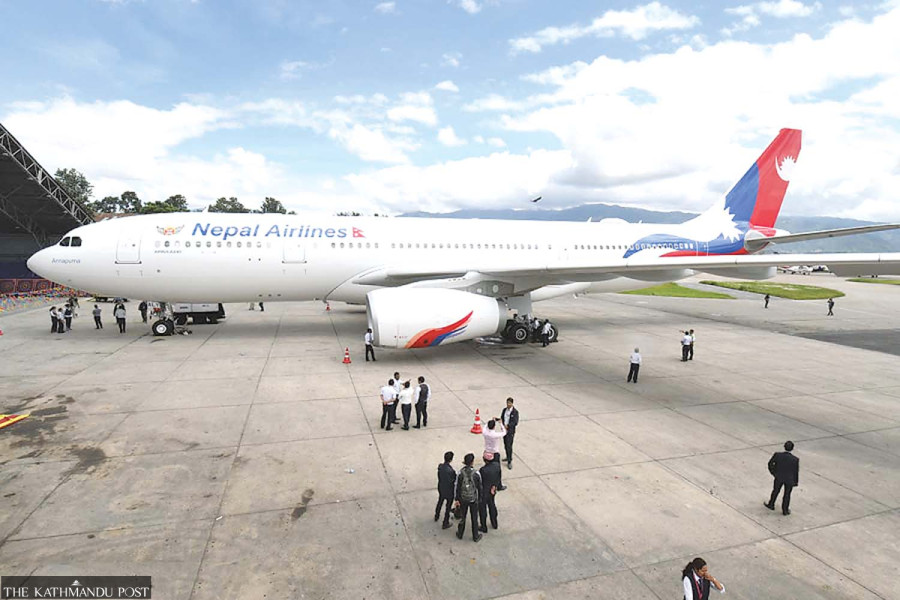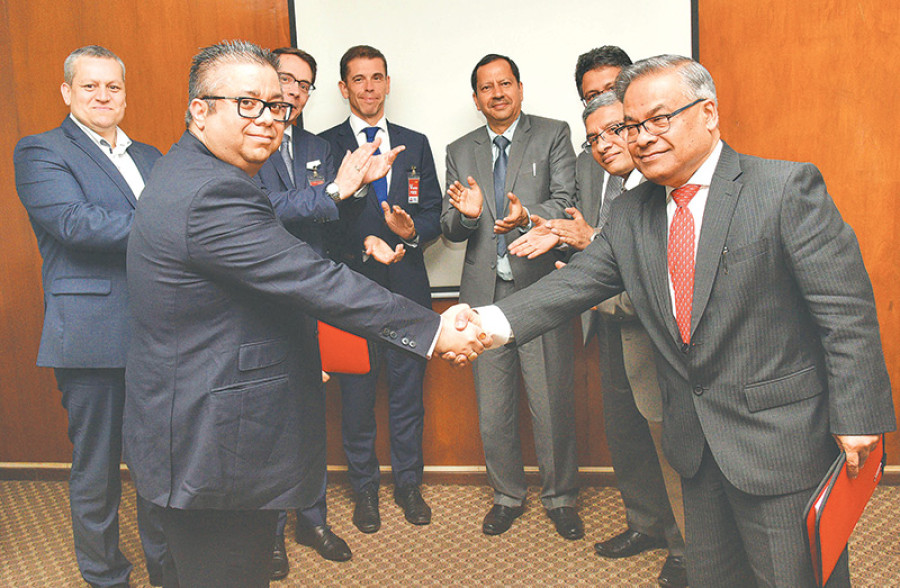Money
UK executive gets US probation in Nepal airbus transaction
Deepak Sharma, a former AAR Corp executive, avoided prison after admitting to a conspiracy to bribe Nepali officials in a multi-million-dollar scheme to benefit AAR Corp.
Sangam Prasain
Deepak Sharma, a UK-based executive at AAR Corp—the firm that supplied two Airbus A330 jets to Nepal Airlines—has been sentenced to three years of probation for his role in a foreign bribery scheme.
Sharma’s sentencing took place on June 27 at 3:38 pm, overseen by US District Judge Amit P Mehta at the US District Court of the District of Columbia.
Judge Mehta sentenced Sharma to three years of probation. He is required to complete 200 hours of community service.
In addition, Sharma was ordered to pay a $150,100 fine and forfeit $130,835, essentially a portion of his annual bonus earned in 2017 during his employment at AAR Corp. The US Government and the judgment indicated no restitution in this case, as there are no victims.
Although Sharma faced a maximum sentence of 60 months in prison, federal prosecutors requested a reduced sentence of 40 months, citing his voluntary
and extensive cooperation with the investigation. The federal prosecutors filed a 5K1.1 Substantial Assistance motion to acknowledge his exceptional cooperation and becoming the government’s star witness against AAR and others during its investigation.
His defense team requested that he not be sentenced to prison, emphasising his cooperation with the government—which included identifying key documents in AAR Corp’s possession that the company had failed to produce prior to Sharma’s proffer sessions and which the government had been unaware of—and his deteriorating health, which requires daily medical care.
Sharma reportedly became emotional during his sentencing hearing while delivering his statement to the court.
He expressed “profound remorse” for his actions, explaining how his desire to protect his job and serve his country of birth had escalated into active participation in a scheme to bribe officials in Nepal and South Africa on AAR’s behalf.
“The sentencing guidelines overstated the gravity of Sharma’s offence because he wasn’t personally enriched by the crime and had no ownership stake in the company and did not benefit beyond his ordinary salary and compensation,” Judge Mehta stated during sentencing.
The Post understands that Judge Mehta questioned the federal prosecutors about why key individuals and co-conspirators had not been charged or brought forward in the case.
The federal prosecutors simply indicated that AAR Corp entered a non-prosecution agreement.
AAR Corp, for its part, admitted corporate responsibility for the actions of its officers, directors, employees, and agents.

In December 2024, the company agreed to pay $55.6 million as part of a settlement to resolve the case. It entered into a non-prosecution agreement with the US Department of Justice and also settled with the Securities and Exchange Commission (SEC).
This effectively means the company admitted to paying bribes to foreign officials to win business contracts and later opted to pay the settlement amount to avoid criminal prosecution of its employees.
Sharma also settled separately with the SEC, agreeing to pay $185,000 in disgorgement.
However, $130,835 of that amount was considered fulfilled under his forfeiture agreement with the Department of Justice.
Sharma, who formerly served as president of Integrated Solutions at AAR and reported directly to the current CEO of AAR Corp, John M Holmes, admitted last year to engaging an intermediary with the consortium led by AAR Corp in the Nepal Airlines deal, who then paid bribes to an official at Nepal Airlines, Nepal’s national flag carrier.
In August 2024, he pleaded guilty to one count of conspiracy to violate the anti-bribery provisions of the Foreign Corrupt Practices Act (FCPA), a US law that prohibits bribery of foreign government officials to obtain or retain business.
In January 2017, the $209.6-million plane purchase deal, the largest in Nepal’s aviation history, was awarded to AAR Corp, the US-based global aerospace company, through a shady deal.
Nepal Airlines invited sealed requests for proposal (RFP) from aircraft manufacturing companies, airlines, aircraft leasing companies and bankers to purchase two A330-200 jets in September 2016.
The deal was questioned right from the start because it avoided the process to buy the planes directly from a manufacturer.
AAR Corp's investigation into Nepal Airlines’ Airbus deal began following allegations of corruption launched by Nepal’s anti-corruption body, which uncovered potential wrongdoings related to bypassing regulations and hidden costs.
The deal involved intermediaries and shell companies in tax havens, making it hard to track the flow of funds.
AAR Corp agreed to pay more than $55 million to settle investigations related to FCPA violations conducted by the US Department of Justice and the Securities and Exchange Commission (SEC). The investigations centred on the company’s activities in Nepal and other countries.
According to official documents released by the US Justice Department on December 19, 2024, the bribery conspiracy involved tailoring procurement documents to benefit AAR.
The documents reveal that the then-managing director of Nepal Airlines, Sugat Ratna Kansakar, had sent a draft of the Request for Proposal (RFP) for purchasing two Airbus A330s to AAR in advance.
This allowed the US-based company to manipulate bidding terms in its favour. The altered RFP was then returned to Nepal Airlines, which issued it publicly.
Between 2015 and 2018, the conspiracy unfolded in multiple stages: the RFP was first prepared and then covertly shared with AAR to be adjusted. The contract was awarded after the manipulated draft was sent back and issued.
According to reports from the US Department of Justice and the Securities and Exchange Commission, the supplier was changed, and a series of intermediary companies set up to facilitate the distribution of bribes.
At the time of the conspiracy, Sharma was an executive at an AAR subsidiary, a role he held from approximately November 2015 through September 2019.
Between November 2015 and August 2018, Sharma and others at AAR conspired to offer and pay bribes to government officials in Nepal—including at Nepal Airlines Corporation—to secure business advantages for the company. The scheme ultimately helped AAR win the bid to sell two Airbus A330-200 aircraft to Nepal Airlines.
According to the investigation report, AAR secured approximately $6 million in profits from the Nepal Airlines transaction as a direct result of the bribery.
The fallout from this scandal has been far-reaching.
In December 2024, Nepal’s Special Court convicted 11 individuals, including four senior Nepali officials, in connection with the Airbus A330 procurement deal.
The court concluded that the irregularities in the aircraft acquisition caused the government a financial loss of Rs1.47 billion ($13.38 million). This figure was calculated based on the exchange rate at the time of the final instalment payment in 2018.
The bench of the Special Court, chaired by Judge Tek Narayan Kunwar with Tej Narayan Singh Rai and Ritendra Thapa as members, issued the convictions.
Despite these rulings, court officials have stated that the case remains open, as parallel investigations are still underway in other jurisdictions. More individuals may yet be implicated as new evidence emerges.
The judgment follows an extensive investigation involving US and Nepali authorities.
The web of corruption, first orchestrated through questionable procurement practices, later involved using intermediary companies to launder bribes, highlighting deep-seated flaws in corporate governance and government oversight.
*The photo and the text have been updated for clarity and accuracy.




 8.67°C Kathmandu
8.67°C Kathmandu














